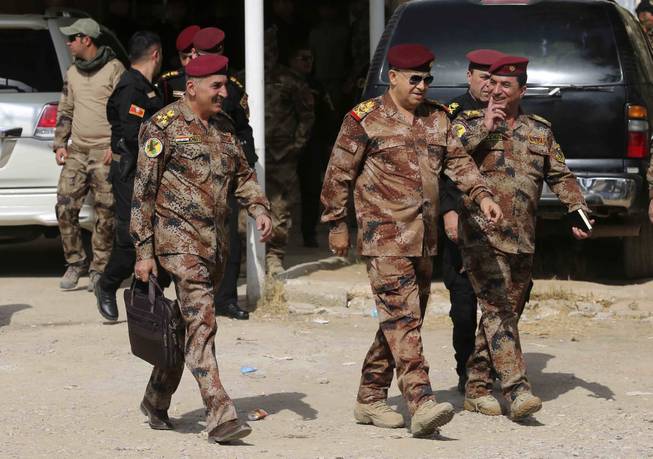
Associated Press
The Commander of the Joint Military Operation Commander, Army Lt. Gen. Talib Shaghati, center, walks in the town of Khazer, Iraq, Wednesday, Oct. 19, 2016. The senior Iraqi general on Wednesday called on Iraqis fighting for the Islamic State group in Mosul to surrender as a wide-scale operation to retake the militant-held city entered its third day.
Wednesday, Oct. 19, 2016 | 10:42 a.m.
KHAZER, Iraq — A senior Iraqi general on Wednesday called on Iraqis fighting for the Islamic State group in Mosul to surrender as a wide-scale operation to retake the militant-held city entered its third day.
The militants have put up fierce resistance in villages surrounding the city, where most of the fighting has been concentrated. IS has sent trucks loaded with explosives careening toward the front lines and fired mortars to slow the Iraqi forces' advance.
Lt. Gen. Talib Shaghati told reporters at a military base that up to 6,000 IS fighters are inside the city. He did not say how many of them are foreigners.
IS captured Mosul, Iraq's second largest city, in a lightning advance in the summer of 2014. The extremist group has suffered a string of defeats over the past year, and Mosul is its last major urban bastion in Iraq.
An Iraqi officer from the 9th Division told The Associated Press that his troops were now around one kilometer (half a mile) away from Hamdaniyah, a historically Christian town also known as Bakhdida, to the east of Mosul.
Over the past day, IS sent 12 car bombs, all of which were blown up before reaching their targets, he said, adding that Iraqi troops suffered a small number of casualties from the mortar rounds. The officer, who spoke on condition of anonymity because he was not authorized to talk to reporters, did not provide specific figures.
To the north, airstrikes pounded Bashiqa as Kurdish forces fired mortar rounds from an area overlooking the IS-held town.
Save the Children said 5,000 people have fled to a refugee camp in northeastern Syria from the Mosul area in the last 10 days, with another thousand waiting to enter at the border.
The group said the overwhelmed camp is "littered with waste and feces, with a looming risk of outbreaks of disease." It said there are just 16 latrines shared by more than 9,000 people, many of whom only have access to dirty, untreated water.
"Conditions there are among the worst we've seen, and we expect thousands more people to be on their way soon," said Tarik Kadir, head of the group's Mosul response.
The United Nations believes up to 1.5 million people in Mosul will be at great risk of being targeted, caught in crossfire, forcibly expelled or used as human shields.
U.N. humanitarian chief Stephen O'Brien told the U.N. Security Council that no large-scale displacement of civilians has been reported since the operation began.
But he said the U.N. anticipates "a displacement wave of some 200,000 people over the coming weeks, with up to one million displaced in the course of the operation in a worst-case scenario."
The operation to retake Mosul is the largest launched by the Iraqi army since the 2003 U.S.-led invasion. Some 25,000 troops, including Sunni tribal fighters, Kurdish forces known as the peshmerga and state-sanctioned Shiite militias known as the Popular Mobilization Units are approaching the city from different directions.
The U.S.-led coalition is providing airstrikes in support of the operation, and more than 100 American soldiers are embedded with Iraqi forces, with hundreds more serving in a support role.
Maj. Gen. Gary Volesky, the top commander of U.S. land forces in Iraq, said U.S. Army Apache attack helicopters are striking IS targets in support of the operation. The deployment of U.S. attack helicopter crews brings added risk for American troops.
The Apaches were being used at night to strike targets from a distance, and their presence was a confidence booster for Iraqi soldiers, Volesky said. He predicted IS would put up a stiff defense in the city but eventually lose and morph into an insurgency.
The chief of the Russian military's General Staff said it has been monitoring the Mosul operation and is concerned that militants might escape to Syria.
"Despite all the uproar on Western TV channels, the operation hasn't started in earnest yet," Gen. Valery Gerasimov said.
He said the Russian military is using aerial assets to monitor for "possible attempts by the militants to break out of Mosul or leave the city for Syria unimpeded."
Russian warplanes in neighboring Syria have been carrying out airstrikes for more than a year in support of Syrian President Bashar Assad's forces.
"We hope that our partners from the international coalition realize what could be the consequences of large groups of IS fighters roaming the Mideast region," Gerasimov said. "They must be destroyed on the spot, not driven from one country to another."

Join the Discussion:
Check this out for a full explanation of our conversion to the LiveFyre commenting system and instructions on how to sign up for an account.
Full comments policy